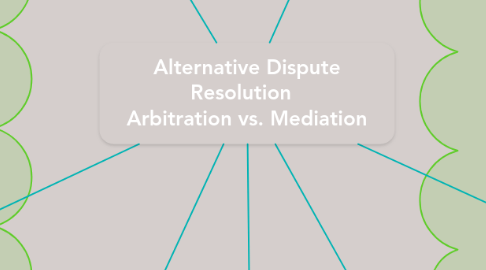
1. Arbitration Advantages
1.1. 1
1.1.1. Generally management and labor representatives are satisfied (My Educator, 2017).
1.2. 2
1.2.1. The process is handled by an impartial 3rd party who makes a decision. Evidence is gathered, reviewed and compared to other similar cases. The decision is final and binding (My Educator, 2017).
1.3. 3
1.3.1. Parties are able to present their case under oath. Decision is based on facts, evidence and law. An arbitrator reviews and provides an award (My Educator, 2017).
2. Arbitration Disadvantages
2.1. 1
2.1.1. There are three general scrutiny’s with arbitration. The cost, the length of time it takes and the process. Each year the cost increase due to the fees and expenses charged by the arbitrator (My Educator, 2017).
2.2. 2
2.2.1. The average time to process a grievance through arbitration is approximately 250 days. Many employer are put off by the length of time (My Educator, 2017).
2.3. 3
2.3.1. According to My Educator (2017), “Creeping Legalism” is the reason the cost and length of arbitration has increased. This is due more cases uses attorneys as arbitrators.
3. Arbitrator Qualities
3.1. Summary
3.1.1. Commonly referred to as "alternative dispute resolution, arbitration is an alternative method of conflict resolution. Those who may be attempting to settle disputes outside of a court can call upon an arbitrator. They assist and are also responsible finding a resolution by taking on the role as a judge in a less formal environment than regular trial courts (Lindsay, 2017).
3.2. 1
3.2.1. Lawyers or professors are known to be arbitrators, although no specific qualities are required (My Educator, 2017).
3.3. 2
3.3.1. A good arbitrator is defined as effective, able to manage the process, the evidence and the counsel. They should also be able to provide a settlement award that cannot be challenged (Roscoe, 2014).
3.4. 3
3.4.1. Education - Unless the state requires a law degree, at minimum a bachelor's degree is required (Lindsay, 2017).
3.5. 4
3.5.1. Certification - There is no certification required, however conflict resolution or alternative dispute resolution training is recommended (Lindsay, 2017).
3.6. 5
3.6.1. Most states prefer that arbitrators hold a law degree in addition to having experience as an attorney or business professional. However, professional arbitrators can complete training through a basic 40 hour course with an additional 20 hours in advanced coursework (Lindsay, 2017).
4. Mediatior Qualities
4.1. Summary
4.1.1. The United States does not have a certification or standard to be a mediator. However, there are qualifications required which can vary from state to state. Court certified mediators are placed on a list that the public can access to obtain their availability to resolve disputes (Kelly, 2017).
4.2. 1
4.2.1. General Education - Related studies in a field pertaining to mediation. Bachelor's degree in psychology, law, conflict resolution management, social work or public policy are general related fields (Kelly, 2017).
4.3. 2
4.3.1. Experience - Working in your related field to obtain experience (Kelly, 2017).
4.4. 3
4.4.1. Certification - Complete a state specific course with 20 hours of course work (Kelly, 2017).
4.5. 4
4.5.1. Advanced Education - Pursue a master's degree in mediation. Certain states require mediators to be licensed (Kelly, 2017).
4.6. 5
4.6.1. Employment - General education, experience, certification nor advanced education guarantee employment. Mediators must apply to be placed on a court roster (Kelly, 2017).
5. Mediation Advantages
5.1. 1
5.1.1. Generally the cost of mediation is lower than the cost of arbitration (My Educator, 2017).
5.2. 2
5.2.1. In mediation the process is much less formal, the parties are able to be actively involved. Mediation is much less stressful than litigation. The best thing about mediation is that the parties control the process and the outcome, not the judge and not the jury. The process is expedited more quickly (My Educator, 2017).
5.3. 3
5.3.1. The mediator is able to assist both sides in understanding the other side’s interest. Information is exchanged on a voluntary basis (My Educator, 2017).
6. Mediation Disadvantages
6.1. 1
6.1.1. The mediator does not control the outcome (FINRA, 2017).
6.2. 2
6.2.1. Settlement only occurs with parties consent (FINRA, 2017).
6.3. 3
6.3.1. Mediation may not be the best recourse for certain issues (FINRA, 2017).
7. References
7.1. 1.
7.1.1. The University of Phoenix. (2017). Risk Management, Topic 3. Retrieved from University of Phoenix, My Educator-HRM/420 website.
7.2. 2.
7.2.1. FINRA. (2017). Retrieved from https://www.finra.org/arbitration-and-mediation/comparison-between-arbitration-mediation
7.3. 3.
7.3.1. Roscoe, J. P. (2014). Does good ADR mean advocacy done right? tips for selecting your best neutral. The Brief, 43(2), 50-52. Retrieved from https://search.proquest.com/docview/1507803267?accountid=35812
7.4. 4.
7.4.1. Kelly, B. (2017). Chron. Retrieved from http://work.chron.com/qualifications-needed-become-court-mediator-22320.html
7.5. 5.
7.5.1. Lindsey, T. (2017). Chron. Retrieved from http://work.chron.com/qualifications-becoming-arbitrator-5992.html
